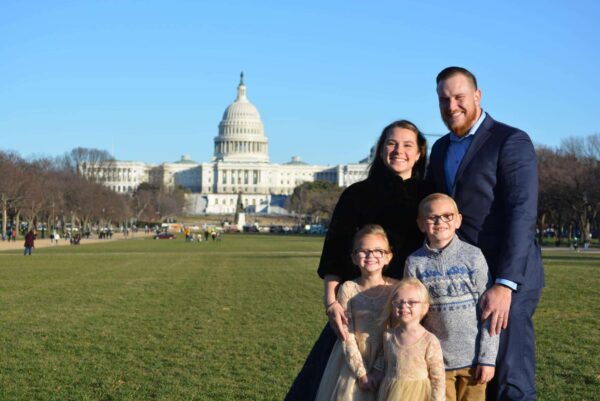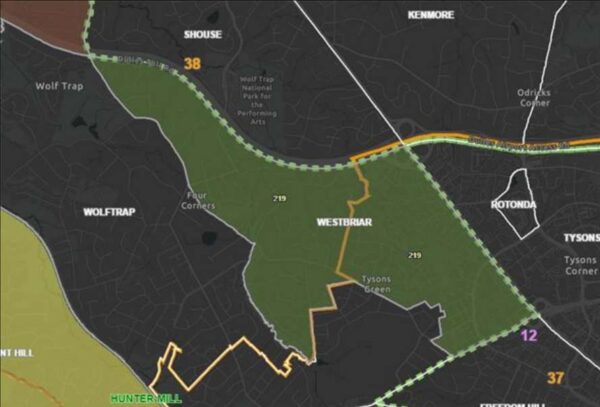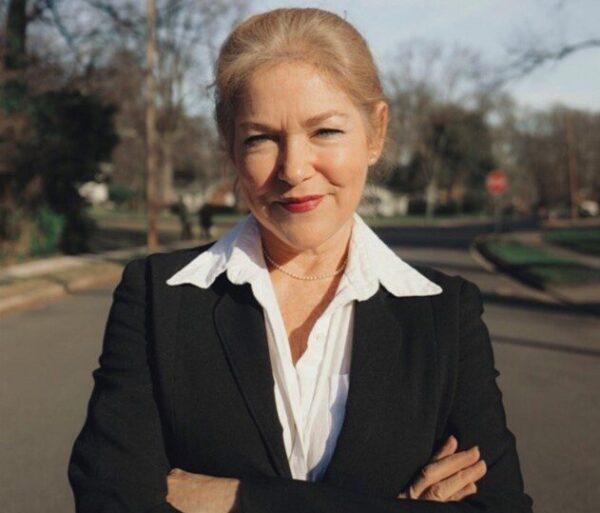
The Fairfax County Department of Transportation intends to pursue funding next year to expand a budding program to improve street safety for pedestrians, bicyclists, and other forms of active, or non-motorized, transportation.
The money would be used to hire a program manager and implement priorities, such as speed reduction measures and improved road design standards, FCDOT Active Transportation Engineer Lauren Delmare told the county Board of Supervisors at its transportation committee meeting on Tuesday (March 1).
If funding is approved in the fiscal year 2024 budget, which would take effect on July 1, 2023, it would formally establish the Safe Streets for All Program that the board directed staff to develop in January 2020.
“Some of these priorities will require additional funding for studies, maintenance, or capital improvements beyond the Safe Streets for All program funding,” Delmare said. “…Others may require additional funding or staffing if the board wants to increase the speed of implementation.”
Among those priorities are the creation of a complete street policy and design guide as well as efforts to reduce vehicle speeds that could include speed limit changes, street design updates and public education.
Hunter Mill District Supervisor Walter Alcorn, who chairs the committee, asked if the county could address vehicle speeds using a state law adopted in March 2021 that authorized local governments to reduce speed limits in residential and business districts to between 15 and 25 miles per hour.
However, the Virginia Department of Transportation determined that under the current law, localities can only reduce speed limits on highways if they fall in residential and business districts.
A bill seeking to let localities lower speed limits by up to 10 miles per hour on all highways in their jurisdictions failed in the House in February, FCDOT Director Tom Biesiadny told the board.
“So, we might be decreasing the speed of implementation of that particular item, unfortunately,” Alcorn said.
More immediately, the transportation department could develop a policy for the program, prioritize active transportation capital projects in high-traffic corridors, and create a dashboard to collect and monitor community members’ safety concerns.
Current ongoing strategies for the program include safety campaigns, reducing conflicts and prioritizing active safety through design such as repaving roads.
The Board of Supervisors is expected to make its decision on these recommendations in May.

The Fairfax County Police Department should implement new training and data collection practices to improve its culture around the use of force, a committee of appointed volunteers says.
The Use of Force Advisory Committee presented recommendations to the Fairfax County Board of Supervisors’ safety and security committee on Tuesday (March 1) based on a study conducted by the University of Texas at San Antonio.
While many of the study’s recommendations were accepted, the committee modified some of them to encourage cultural changes that it believes will be good for the department and the community.
“Without cultural change, internally and externally, policy change will not make meaningful and impactful improvements for a safer community and a safer Fairfax,” committee co-chair Yolonda Earl-Thompson said, emphasizing the importance of both FCPD leaders and officers embracing reform.
In addition to documenting uses of physical force by officers and resistance by citizens, the committee says police should gather data on the use of de-escalation techniques and their effectiveness, officers’ attempts to halt or prevent a use of force by colleagues, and other relevant variables.
It also recommends tracking instances where use of deadly force is authorized to reduce the risk of selection bias.
Released in June, the UTSA study examined 1,360 use-of-force cases from January 2016 to December 2018. It found that 42% of cases involved Black individuals, compared to 38% for white people, and Black people were 1.8 times more likely to have a weapon pointed at them by police.
The committee disagreed with the study’s recommendation that officers regularly rotate out of “high crime” patrol areas and district stations to avoid burnout, arguing that officers should be familiar with the specific community they serve to help build trust.
After the presentation, Fairfax County Police Chief Kevin Davis announced that the FCPD has adopted the ICAT training guide recommended by the UTSA study and will begin to train officers beginning in April 2022.
Chief Davis also announced that the department would begin training with non-lethal tools, such as BolaWraps, which can restrain suspects with minimum force.
Braddock District Supervisor James Walkinshaw suggested the department implement a program to teach officers about Fairfax County’s history, especially when it comes to generational trauma.
Police should use a “trauma-informed perspective” that understands the experiences of people of color, immigrants and undocumented residents, individuals with behavioral health or substance-use challenges, and other communities most affected by police violence, Earl-Thompson said.
“So many of the facts of that — from slavery through Jim Crow, Reconstruction, redlining, etcetera, etcetera — have been erased from so many of our history books,” Walkinshaw said. “If our officers got that, they would really be ahead of the game in terms of understanding the community.”
Davis implemented a similar program while serving as police commissioner in Baltimore. He agreed that it could be invaluable to graduates coming out of the academy.
Photo via FCPD/Facebook

The field of contenders for the 11th District Congressional race is widening.
Republican Matthew Chappell has thrown his hat into the ring, giving the GOP its first primary with multiple candidates since Democratic incumbent Rep. Gerry Connolly took office in 2009.
Father of three children with wife Jacqueline, Chappell is a U.S. Army veteran who worked in counterintelligence and served in Iraq and Afghanistan. He has also worked as a police officer and a national security advisor with the Department of Defense.
Chappell says he decided to run for Congress after the U.S. pulled troops out of Afghanistan in August. While he conceded that the withdrawal likely couldn’t have been handled better under a different president, Chappell feels that Afghans and American soldiers were left behind and promises made had been broken.
“I have Afghan people messaging me daily on WhatsApp and my email. They’re interpreters and people who helped run infrastructure on our bases and they’re terrified for their lives,” Chappell said. “They expected something from us and we didn’t deliver. It hurt me and I’ve lost friends there.”
After his eight-year tenure in the Army, Chappell spent three years as a police officer in Georgia. His interest in the profession came in part from his stepfather, who was a police officer and instilled in him a dedication to helping others and commitment to public service.
Rather than let the job’s challenges wear him down, Chappell focused on the benefits of being a policeman, such as interacting with the community. It also enabled him to address issues like domestic violence, which he and his mother experienced when he was young.
That experience also inspired Chappell’s support for the right to bear firearms.
Chappell says he has no hesitation about calling out bad cops that target minorities and make racist comments.
“I saw a lot of police officers who care and did what they could to help people and I met officers who should have never been allowed to wear the badge,” he said. “I’ve worked with people who weren’t doing it for the right reasons, and I’ve stood at the forefront of calling these people out.”
Chappell is also concerned about the mental health of veterans and improving health care at the Veterans Association. He says he has been diagnosed with post-traumatic stress disorder and has had friends die by suicide due to PTSD.
Chappell joins Democrat Ally Dalsimer in seeking to unseat Connolly. Dalsimer similarly criticized the incumbent’s record on war and claimed he has neglected constituents, especially the LGBTQ community.
“He doesn’t listen to people,” Chappell argues. “We have a very large LGBT community here in [Northern Virginia] and he doesn’t do anything for them. I’m one of the few, especially on the Republican side, that want to help that group.”
Chappell added that he opposes letting transgender people participate in single-sex sports teams but supports their right to transition.
Chappell’s views on other issues, such as abortion and education, can be found on his website.

More than half of Fairfax County’s 247 voting precincts need to be revised to eliminate conflicts created by last year’s redistricting process.
The Fairfax County Board of Supervisors voted yesterday (Tuesday) to hold a public hearing on March 8 to get feedback on proposed boundary adjustments that will consolidate precincts, create new ones, and move or establish new polling places.
The changes would affect 154 precincts, 54 which were split by the new electoral district maps drawn by the Virginia Supreme Court. Another 100 will be affected by the county’s efforts to fix the split districts.
A total of 29,000 registered voters, or 4% of the voter roll, would be affected by the changes, according to the county.
The county underwent its own redistricting process last year, with the board ultimately approving maps in December that moved seven precincts. The new maps received a certificate of no objection from the Virginia Attorney General’s office in January.
However, the Virginia General Assembly passed an amendment in 2020 that prohibited the use of split precincts except in very limited cases, requiring precincts to be contained within a single magisterial, state senate, delegate, or congressional district. It also bars localites from creating a new precinct with more than 5,000 voters.
Before the amendment’s passage, a single precinct could serve voters in two different legislative districts, so voters would receive different ballots based on the district they resided.
The amendment specifically says a split precinct can only be legal is if the area has less than 100 voters, and the split can’t be avoided.
The Fairfax County Office of Elections’ plan for addressing the currently split precincts has to follow four guidelines:
- Disrupt the fewest voters possible
- Ensure the affected precinct boundaries and polling places meet all legal requirements, such as location and accessibility
- Provide adequate parking and other facilities at polling places
- Minimize the number of extremely small or extremely large precincts
Once the changes are approved by the Board of Supervisors, they must be reviewed by the Virginia Office of the Attorney General, which could take up to 60 days, and meet the standards set by the U.S. Voting Rights Act.
The county is required to have the plan in place before the primary elections on June 21. A full list of the proposed changes can be found in the package for yesterday’s board meeting.
Fairfax County businesses added nearly 9,000 jobs over the course of 2021, even with the uncertain environment created by the COVID-19 pandemic, the county’s economic development authority says.
According to a press release, the Fairfax County Economic Development Authority worked with 146 businesses that added a total of 8,973 jobs to the Fairfax County economy.
The businesses came from a variety of sectors, from manufacturing and real estate to information technology and cybersecurity. They were also spread out throughout the county, including Chantilly, Reston, Fairfax, Tysons, and Herndon.
Of the 146 businesses that reported job growth, 14 were newcomers that the FCEDA had courted to come to Fairfax County. Many were attracted not just from other areas of the U.S., but from other countries.
The seafood company Starkist, which is owned by Korean-based Dongwon Group, is relocating its headquarters from Pittsburgh to Reston Town Center. Other examples include the Canadian-based Brookfield Residential Properties and Israeli aerospace and defense company D-Fend Solutions.
According to data provided by the authority, the sector that saw the most growth was information technology services, which accounted for 2,648 new jobs, or 29.5% of the new positions in the county.
Much of that growth came courtesy of Herndon-based Peraton, which added 1,200 positions in 2021. The contractor announced plans in December to move its corporate headquarters to Reston Town Center.
“We would be proud to announce almost 9,000 jobs in any new year,” FCEDA President and CEO Victor Hoskins stated in the press release. “But very few communities can claim the kind of diversity that we have in our business community.”
FCEDA also touted that 25 of the American companies that came to the county are owned by women, minorities, or veterans.
Those businesses were found mainly in the information technology sector and include the Fairfax-based Kreative Technologies, which created 296 jobs, and Tysons-based Alpha Omega Integration, which created 154 jobs.
The nonprofit Community Foundation of Northern Virginia released a report in June 2021 showing that minority-owned businesses in Fairfax County have suffered more acutely than white-owned businesses during the pandemic.
The report stated that while the number of minority-owned businesses remained flat, revenue and staffing dramatically decreased, while unemployment insurance claims rose.
Fairfax County has worked to support local businesses during the pandemic by distributing federal relief funds through a series of grant programs, including the Fairfax RISE initiative that distributed more than $52 million in 2020 — 72% of which went to minority, women, or veteran-owned businesses.
The county awarded $16.8 million in grants last year with its PIVOT program, which focused on small businesses and the hospitality industry.
The FCEDA has been hosting virtual job fairs and other events to connect employers with workers as part of its Work in Northern Virginia initiative.

Fairfax County voters will have at least one primary on their hands in this year’s midterm elections.
Ally Dalsimer, an environmental advocate whose experience includes work under the Obama administration, is campaigning against Rep. Gerry Connolly for Virginia’s 11th District seat, which represents most of Fairfax and Prince William counties.
Dalsimer kicked off her candidacy in June but is now ramping up her campaign, with a virtual meet-and-greet on Sunday (Feb. 6), where she hopes to be able to talk to the public and listen to their concerns.
“I would just like the chance to talk to the people, tell them my thoughts and what I can do for them. And I want to hear back from them, questions, comments, the issues they’re concerned about,” Dalsimer told FFXnow.
Set for June 21, this will be the second Democratic primary that Connolly has faced since first assuming his current office in 2009. He previously defeated challenger Zainab Mohsini in 2020.
Dalsimer believes her professional and personal experiences have prepared her to serve in Congress as someone willing to reach across the aisle.
The daughter of a Scottish immigrant mother and a father in the U.S. Foreign Service, Dalsimer and her family spent time living in Central and West Africa before moving to Northern Virginia when she was 8.
She credits those experiences abroad with teaching her the value of respecting other’s differences and embracing other cultures, a message that she hopes to carry through efforts like her campaign sharing resources for the Afghan refugees.
“At the end of the day, in spite of the small differences between us, we’re all just people,” Dalsimer said.
Dalsimer’s career in environmental preservation began at a nonprofit foundation after she graduated from Georgetown University with a master’s degree in public policy, environmental law, and economics.
From there, she went on to manage the Department of Defense’s Natural Resources Program, co-found several national conservation initiatives, and implement policy changes for natural resources while serving on the White House Climate Council under President Barack Obama.
In addition to the environment, Dalsimer is passionate about health care, particularly after losing her husband to cancer in 2015, mere days before his 52nd birthday.
While her husband had health insurance, Dalsimer is aware that there are others who aren’t as lucky, especially after the historic job losses triggered by the COVID-19 pandemic. She supports the single-payer, universal health care system touted by progressives like Vermont Sen. Bernie Sanders.
“I don’t think anyone should be left without any way to get medical help just because they lost their job,” said Dalsimer.
Dalsimer also cites war as a subject she wants to tackle if elected. Her legislative goals include a law that would prohibit corporations from profiting from the sale of weapons and equipment meant for war.
“It’s one thing to sell an airplane for the purposes of travel and profit from the sale, that’s fine. That’s the free market,” Dalsimer said. “But to sell a plane meant for war and to gain a profit from it is just wrong in my view.”
Dalsimer says her interest in running for Congress grew out of the tumultuous events of 2020, including the pandemic and the Black Lives Matter protests in response to George Floyd’s murder, as well as the Trump administration’s actions on the environment, such as the dissolution of the White House Climate Council.
After watching “Knock Down The House,” a 2019 documentary that followed four women running for Congress, Dalsimer got her son’s support to run for office and spent the next six months asking her neighbors and county residents for their opinion of her potential campaign.
She says the response was positive, especially since those she talked to were less than positive about Connolly.
“He’s against universal health care, and said he’d never vote for it,” she said. “He’s allowed corporations to profit from the sale of weapons of war, and there are those in the LGBTQIA+ community who say he hasn’t done anything for them.”
FFXnow contacted Connolly’s office for comment but did not get a response by press time.


